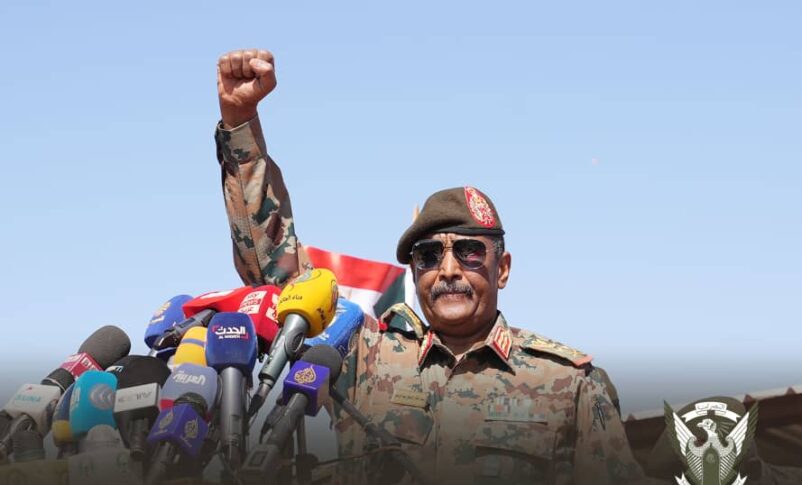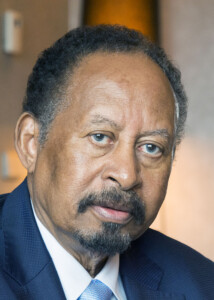Sudan’s army commander optimistic about formation new govt

Commander-in-Chief of the Sudan Armed Forces, Lt Gen Abdelfattah El Burhan, giving a speech in 2022 (file photo: Sudan Armed Forces)
KHARTOUM –
The head of the Sovereignty Council and commander of the Sudan Armed Forces, Lt Gen Abdelfattah El Burhan, has expressed his optimism about the signing of a Final Agreement between the military and the civilian opposition, which will pave the way for the formation of a new government.
In an interview with the Qatari Al Sharq newspaper, El Burhan affirmed the military’s commitment to the Framework Agreement, signed on December 5 last year, signed by the junta and more than 40 opposition parties and groups, under the umbrella of the mainstream Forces for Freedom and Change (FFC-Central Council).
The military establishment supports the desired democratic transition process and will exit from the political scene as soon as a new civilian prime minister has been appointed, he said.
He noted that the military will work with all parties “to persuade those who oppose reaching a final agreement, as the current political process cannot reach its goals in isolation from the rest of the political forces.”
The army leader lauded the initiative put forward by Cairo in early January that came “within the framework of Egypt’s pivotal role in resolving the current crisis, by organising a Sudanese-Sudanese dialogue that ultimately will lead to a real, lasting and comprehensive settlement”. He expressed his hope that the proposed initiatives would result in a broad consensus that will facilitate the democratic transition process.
He called the economic situation the biggest challenge for the new, civilian government which should “carry out comprehensive economic reforms to end the economic deterioration”.
El Burhan further accused parties he did not name of seeking to eliminate the Sudanese state through tribal fighting and regional wars and questioning the leadership of the army.
Hold-out groups
The FFC-CC has reportedly urged the South Sudanese authorities to intercede with Jibril Ibrahim, leader of the Justice and Equality Movement (JEM) and Minni Minawi , head of the breakaway Sudan Liberation Movement (SLM-MM), to convince them to sign the Framework Agreement.
The JEM and SLM-MM are members of the FFC-Democratic Block formed in early November last year and which attended the Sudanese-Sudanese dialogue in Cairo in February. The FFC-CC, that rejected the “Egyptian interference”, refuses to acknowledge the FFC-DB, and keeps to the principle that the only parties from the FFC-DB entitled to sign the Framework Agreement are those that have been previously agreed upon, namely the JEM and the SLM-MM.
JEM leader Jibril Ibrahim, who is also deputy head of the FFC-DB, and acting Minister of Finance, said in December that he will not sign the Framework Agreement if the amendments proposed by the FFC-DB are not included in the text. “Whoever expects to be able to convince us to sign is delusional.”
Transitional justice
On Thursday, the AU-IGAD-UNITAMS Trilateral Mechanism that is brokering the dialogue between the military junta led by El Burhan and various opposition parties headed by the FFC-CC, announced the holding of a series of meetings in Khartoum on justice and transitional justice.
The mechanism said in a press statement that it held a meeting on Wednesday with representatives of the Civil Coalition for Transitional Justice, the signatories to Framework Agreement, as well as Sudanese experts in the field of justice.
The preparatory meetings will continue in the coming days and include members of international organisations active in the field of justice.
The FFC-CC announced in November last year that an agreement with the military to withdraw from the political scene would be done in two stages. After the signing of the Framework Agreement, dialogue conferences on five contentious issues (empowerment removal, transitional justice, reform of security and military institutions, a review of the 2020 Juba Peace Agreement, and the issue of eastern Sudan) would be launched in Khartoum. The outcomes were to be discussed with the junta and laid down in a Final Agreement after which a new civilian government of technocrats is to be formed.
The conferences on empowerment removal, the Juba Peace Agreement, and the issue of eastern Sudan took place in January and February.
In end January, the FFC-CC officially confirmed rumours on the postponement of the conferences on (transitional) justice and security and military reform, and announced that they would be held after the formation of a new civilian government.











 and then
and then